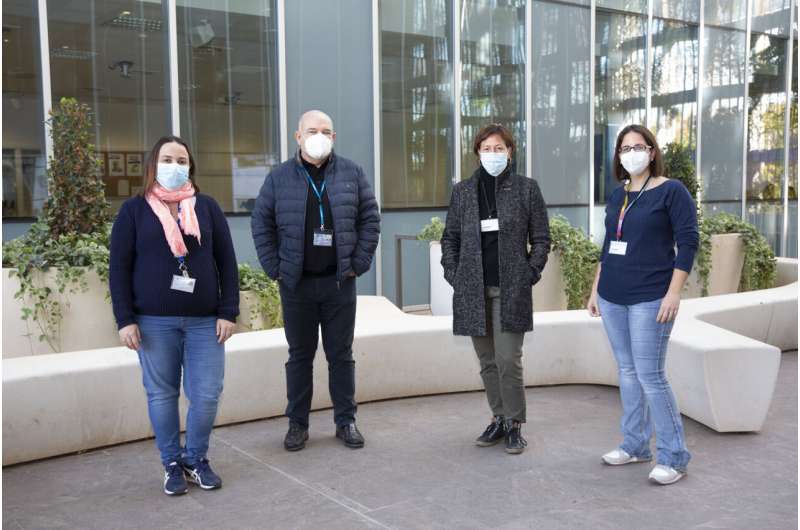Avoiding COVID-19 infections during laparoscopic procedures

A team of researchers from the Department of Medicine of the Universitat Jaume I and health professionals from the Multidisciplinary Unit of Abdominopelvic Oncological Surgery (MUAPOS) together with the rest of the services that make up the surgical block of the General University Hospital of Castellón, have carried out a study (COVIDLap) that has improved safety conditions during laparoscopic interventions to avoid contagion by COVID-19 among both health personnel and patients.
The study has been made possible thanks to the fundraising campaign promoted by the public university of Castelló to alleviate the economic and health effects of the coronavirus, aimed at raising resources to support the most vulnerable students and research against COVID-19. #SomUJIcontraCOVID raised more than 73,000 euros thanks to the solidarity of 425 donations from individuals (45 percent) and 17 entities (55 percent) including sponsors, collaborators and companies. The research has also been supported by the Medtronic Chair in Surgical Training and Research of the UJI.
The pandemic caused by SARS-CoV-2 put the world's healthcare systems to the test, raising doubts and uncertainty about the safety measures to be taken during routine hospital activities. Therefore, the research team from Castellón designed a cross-sectional prevalence research as a pilot study to provide scientific information on the safety of laparoscopic interventions during the COVID-19 pandemic.
Under normal conditions, laparoscopy is a safe surgical procedure that creates a physical barrier between the surgeon and the patient, thus avoiding occupational exposure and cross-contamination. At the beginning of the pandemic, different world surgical societies established general recommendations for interventions (use of personal protective equipment, training of healthcare personnel, etc.) and specific recommendations for laparoscopy (increased airway and mucosal protection and recommendation to use smoke filters in the cannulas of laparoscopy ports).
The research group analyzed between April 2020 and May 2021 the presence of SARS-CoV-2 viral particles in the carbon filters placed in the cannulas of the laparoscopy ports during interventions at the Hospital General Universitario de Castellón. The results show that patients with negative pharyngeal PCR for SARS-CoV-2 may have COVID-19 contamination in abdominal organs which, when exposed to ambient air, could increase the risk of contamination of operating theaters and healthcare staff.
They have also proven that minimally invasive surgery with controlled evacuation of abdominal air (such as laparoscopy) is much safer than classic laparotomy and have demonstrated that the first recommendations of the surgical scientific societies based on expert opinions were not entirely correct, albeit necessary, according to the research team.
The results indicate that no patient has had a positive oropharyngeal test after surgery, but the evidence suggests that airborne transmission of SARS-CoV-s particles from smoke evacuation of virus-carrying aerosols should be taken into account, so the team responsible for the study recommends "taking additional safety measures in the operating room such as minimizing the entry and exit of forceps and optics through abdominal trocars to avoid pneumoperitoneum leakage; limiting the number of professionals in the operating room, always wearing FFP2 protective masks or monitoring for SARS-CoV-2 aerosols in the operating room."
In the opinion of the health professionals, "the opportunity offered by the Universitat Jaume I and the trust shown by all the people and entities that have backed the initiative, giving their support to a translational medicine project, generated in the hospital environment and developed in the university laboratory, has allowed us to improve the safety of patients and professionals in the surgical environment of hospitals." The results have been so relevant that the different scientific societies have already issued a health alert informing about this work.
During the research, a total of 180 smoke filter systems used in different laparoscopic surgeries of specialties such as digestive (45 percent), gynecological (37 percent) and urological (18 percent) were collected and 130 of them were subsequently analyzed in the Microbiology Laboratory of the Department of Medicine of the UJI. The sample consisted of 62 percent of men and 38 percent of women and the average age of the patients was 60 years. There were 20 percent of emergency surgeries and the rest were elective surgeries, and 47 percent of them lasted less than 120 minutes. This study would not have been possible without the involvement and willingness of the entire surgical team of the hospital and the help of the HGUCS Biobank, part of the public network of the Valencian Community.
More information: Antoni Llueca et al, SARS-CoV-2 Prevalence in Laparoscopic Surgery Filters. Analysis in Patients with Negative Oropharyngeal RT-qPCR in a Pandemic Context: A Cross-Sectional Study, Journal of Personalized Medicine (2021). DOI: 10.3390/jpm11111052





















